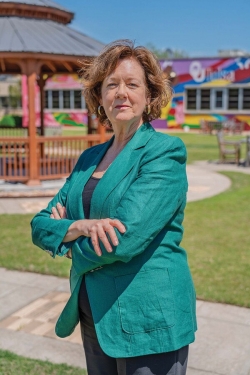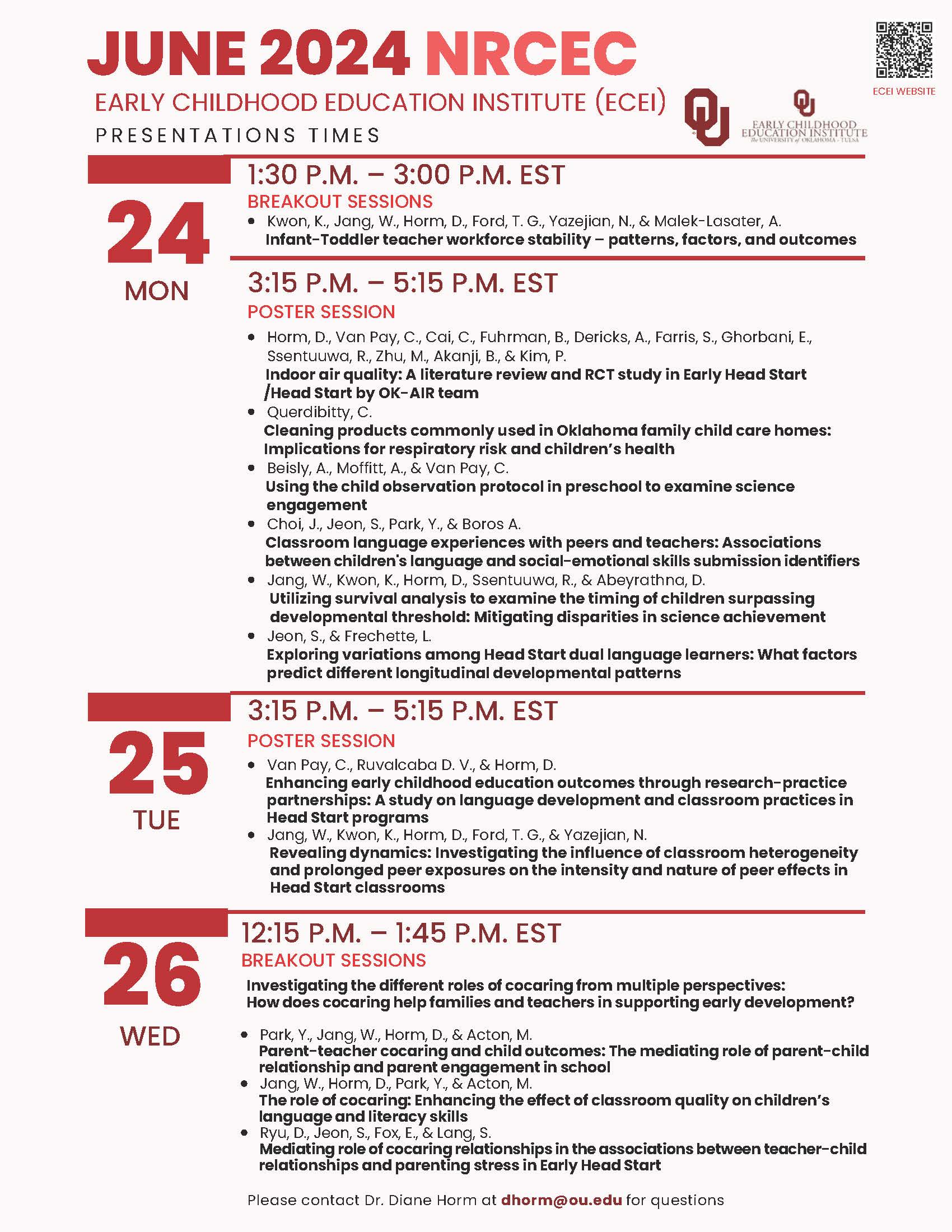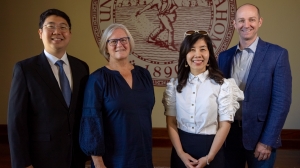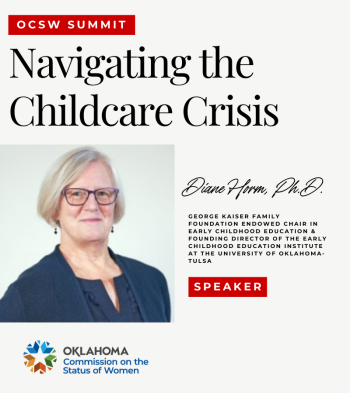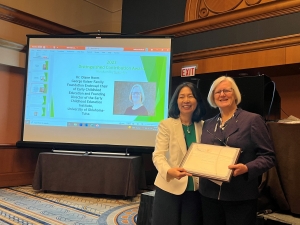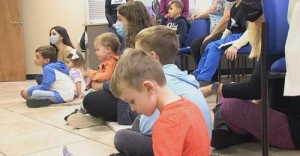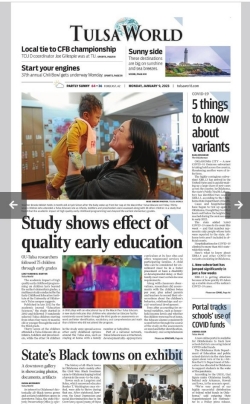May 29, 2024
University of Oklahoma to Evaluate $36M Federal Grant to Strengthen State’s Early Childhood Systems
An interdisciplinary team of researchers from the University of Oklahoma has received a portion of a $36 million grant from the U.S. Department of Health and Human Services to evaluate strategies designed to strengthen educational support for Oklahoma’s children, ages birth through five years. Oklahoma’s Department of Human Services, in collaboration with the Oklahoma Partnership for School Readiness, was awarded this three-year grant and has contracted with OU researchers to lead the evaluation component.
“We look forward to once again working with the research teams from OU,” said Oklahoma Partnership for School Readiness Executive Director Carrie Williams. “Their level of knowledge and expertise on the topic of early childhood care and education, or ECCE, makes OU the logical and best choice to evaluate the work we will be doing to improve systems and outcomes that will benefit Oklahoma’s children and families through this federal grant.”
The OU team leading the evaluation includes Erin Maher, Ph.D., Diane Horm, Ph.D., and David McLeod, Ph.D., MSW. They will focus on three areas of evaluation of ECCE strategies: community engagement, workforce development and quality enhancement. OU’s Educational Training, Evaluation, Assessment & Measurement research group will also support the endeavor with project management and data collection.
According to Horm, this research is especially important in Oklahoma because access to high-quality early childhood services is good for all children and particularly good for children who are considered at risk for a variety of reasons – including identified disabilities or living in minority or underrepresented communities. Oklahoma has a particularly high percentage of children considered at risk for school failure.
“Our state ranks low in indicators of health and education and has a high number of children growing up in poverty,” Horm said. “We also have a high number of adverse childhood experiences, or ACEs. These are things like abuse or neglect, homelessness or witnessing violence in the home. High ACE scores are one reason that Oklahoma needs support for children ages birth to five years.”
The results of this project could be significant, potentially improving the education and overall quality of life for children in Oklahoma, who demonstrate among the highest ACE scores in the country.
“There’s a constellation of factors that contribute to the trauma Oklahoma’s children endure. But this doesn’t have to be a sentence for a horrible life,” McLeod said. “How we engage in the education process is a major way to mitigate this trauma, and ages birth to five is a great time to give children support and to help their helpers. We must multiply our efforts and get other helping professionals trained in high-value, evidence-based activities to improve overall quality of life and dramatically help more children.”
Prior research published by Horm and OU’s Early Childhood Education Institute indicates that the earlier a child enters a high-quality early education program, the more likely they are to achieve at higher levels through the third grade than their community peers who did not have access to high-quality early childhood education and care birth through ages four or five.
“It used to be that getting a head start on kindergarten entry meant enrolling four-year-olds,” Horm said. Over time, we learned that four was too late, so we started looking at three-year-olds. Now we know that if you really want to impact a child’s development trajectory, they need to start as infants.”
Oklahoma pioneered access to high-quality ECCE through its universal pre-K program, which more than 80% of all children now attend. This program's success has bipartisan support and has been proven successful in research by Nobel Prize-winning economist James Heckman.
“Beyond that, Oklahoma has determined that access to affordable, high-quality childcare also supports parent employment,” Maher said. “If we want to grow economically as a state, access to high-quality ECCE provides a huge return on investment. This is especially true for rural and high-need communities.”
A particular high-need community is already being served by the University of Oklahoma’s Parent-Child Assistance Program, or PCAP. Overseen by Erin Maher, this program benefits the well-being of Oklahoma Children, birth to age five, who were exposed to drugs and alcohol in the womb.
“The state of Oklahoma has identified the need to support vulnerable families and families affected by substance use disorders. These are the very families that PCAP helps and that, together with high-quality ECCE programs, can make a profound influence on child well-being,” Maher said.
This collaboration between OPSR and OU is mutually beneficial because the need for social program evaluation is so great. Partnerships with OU help meet that demand and also provide opportunities to train younger faculty to do this work.
“Projects like this are great for us, as senior faculty members, to mentor early-career and mid-career faculty while also building expertise and capacity to take on important work for the state of Oklahoma,” McLeod said. “They also allow us to connect our scholars with the organizations and agencies that have the biggest impact on the future of Oklahoma.
At the end of the three-year grant, these researchers have high expectations that they can document improvements that help support and sustain high-quality ECCE programs. These federal awards come with evaluation requirements for accountability, improvement and sustainability purposes.
“Much like healthcare, education is holistic, and ECCE programs set people up for success. My hope is that we can establish and embolden a strong early childhood system that can have a positive impact on child development, family functioning and our economy,” McLeod said. “This is something our state desperately needs, especially in rural and low-income communities across Oklahoma.”
Maher added, “These findings will also be useful for our state legislators to ensure high-quality ECCE is available and accessible to all families.”
Learn more about the DHS Preschool Development Grant Birth through Five Renewal grant and the University of Oklahoma’s Early Childhood Education Institute and the Oklahoma Parent-Child Assistance Project.
About the project
Through this grant, which was awarded by the U.S. Department of Health and Human Services’ Office of Child Care, Administration for Children and Families, the state of Oklahoma will receive $12 million per year for three years 2023-2025. Erin Maher is an associate professor of sociology and senior associate director of OU’s Data Institute for Societal Challenges. Diane Horm is the George Kaiser Family Foundation Endowed Chair of Early Childhood Education and Founding Director of the Early Childhood Education Institute. David McLeod is a professor and interim director of OU’s Anne and Henry Zarrow School of Social Work.

